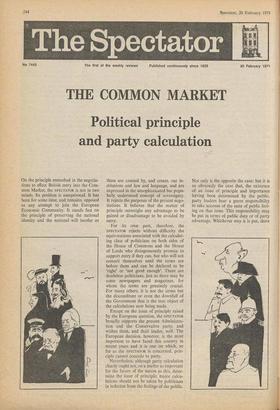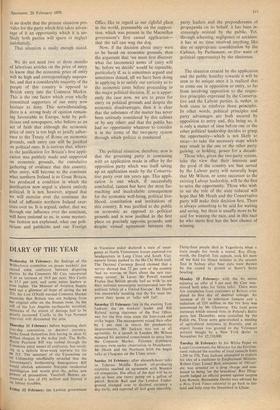THE COMMON MARKET Political principle and party calculation
On the principle enmeshed in the negotia- tions to effect British entry into the Com- mon Market, the SPECTATOR is not in two minds. Its position is unequivocal. It has been for some time, and remains, opposed to any attempt to join the European Economic Community. It stands fast on the principle of preserving the national identity and the national will insofar as these are created by, and create, our in- stitutions and law and language, and are expressed in the unsophisticated but popu- larly understood concept of sovereignty. It rejects the purposes of the present nego- tiations. It believes that the matter of principle outweighs any advantage to be gained or disadvantage to be avoided by entry.
For its own part, therefore, the SPECTATOR rejects without difficulty the equivocations associated with the calculat- ing class of politicians on both sides of the House of Commons and the House of Lords who disingenuously promise to support entry if they can, but who will not commit themselves until the terms are before them and can be declared to be `right' or 'not good enough'. There are doubtless politicians, just as there may be some newspapers and magazines, for whom the terms are genuinely crucial. For many others, it is not the terms but the discomfiture or even the downfall of the Government that is the true object of the calculations now being made.
Except on the issue of principle raised by the European question, the SPECTATOR broadly supports the present Administra- tion and the Conservative party, and wishes them, and their leader, well. The European decision, however, is the most important to have faced this country in recent years and it is one on which, so far as the SPECTATOR is concerned, prin- ciple cannot concede to party.
Nevertheless, although party calculation clearly ought not, on a matter as important for the future of the nation as this, deter- mine the issue of principle, major calcu- lations should not be taken by politicians in isolation from the feelings of the public. Not only is the opposite the case: but it is so obviously the case that, the existence of an issue of principle and importance having been determined by the public, party leaders bear a grave responsibility to take account of the state of public feel- ing on that issue. This responsibility may be put in terms of public duty or of party advantage. Whichever way it is put, there is no doubt that the present situation pro- vides for the party which first takes advan- tage of it an opportunity which it is un- likely both parties will spurn or neglect indefinitely.
That situation is easily enough stated.
We do not need two or three months of laborious articles on the price of entry to know that the economic price of entry will be high and correspondingly unpopu- lar, and that a considerable majority of the people of this country is opposed to British entry into the Common Market. This is the one factor which even wholly committed supporters of our entry now hesitate to deny. This notwithstanding, there is a strong body of opinion remain- ing favourable to Europe, held by poli- ticians and newspapers, who believe as an act of faith' that although the economic price of entry is too high to justify adher- ence to the Treaty of Rome on economic grounds, such entry can still be justified on political ones. It is curious that, where- as the justification for Britain's first appli- cation was publicly made and supported on economic grounds, the cumulative gathering of evidence that this country, after entry, will become to the continent what northern Ireland is to Great Britain, has produced a condition in which the Justification now urged is almost entirely political. It is not, however, argued that we will exercise over the continent the kind of influente northern Ireland exer- cises over us. It is argued, rather, that we, through our influence over the continent, Will have restored to us, in some mysteri- ous fashion not explained, what our poli- ticians and publicists and our Foreign Office like to regard as our rightful place in the world, presumably on the supposi- tion, which was present in the Macmillan government's first casual application— that the tail can wag the dog.
Now, if the decision about entry were to be based on economic grounds, then the argument that 'we must first discover what the (economic) terms of entry will be, before we decide' would be reputable, particularly if, as is sometimes argued and sometimes denied, all we have been doing in applying is to satisfy our curiosity as to the economic costs before proceeding to the major political decision. If, as is appar- ently the case now, we are to press for entry on political grounds and despite the economic disadvantages, then it is clear that the substance of the matter has never been seriously considered by this cabinet or by any other; and that the public has had no opportunity whatever to consider it in the terms of the two-party system through which politics is conducted. - The political situation, therefore, now is that the governing party is continuing with an application made in office by the opposition party which was itself taking up an application made by the Conserva- tive party over ten years ago. This appli- cation is one which, if successfully concluded, cannot but have the most far- reaching and incalculable consequences for the economic well-being, political live- lihood. constitution and institutions of this country. It was justified to the public on economic as opposed to political grounds and is now justified in the first place on precisely opposite grounds, and despite virtual agreement between the party leaders and the preponderance of propaganda on its behalf, it has been in- creasingly resisted by the public. Yet, through scheming, negligence or accident, it has at no time received anything like due or' appropriate consideration by the Cabinet, by Parliament, or (for want of political opportunity) by the electorate.
The situation created by the application and the public hostility towards it will be seen to be unique once it is realised that to come out in opposition to entry, so far from involving opposition to the respec- tive principles expressed by the Conserva- tive and the Labour parties, is, rather, in both cases to reinforce those principles. In other words, political principles and party advantages are both secured by opposition to entry and, this being so, it is only a matter of time before one or the other political leadership decides to grasp the opportunity—which is not likely to recur—to take the necessary steps which may result in the one or the other party gaining, or holding, power for a decade.
Those who, given the two-party system. take the view that their interests and the good of the country are best served by the Labour party will naturally hope that Mr Wilson, or some successor to the existing Labour leadership, will be the first to seize the opportunity. Those who wish to see the role of the state reduced will hope that Mr Heath and the Conservative party will make their decision first. There is always something to be said for waiting and seeing, but there is usually more to be said for winning the race, and in this race he who starts first has the best chance of winning.



































 Previous page
Previous page